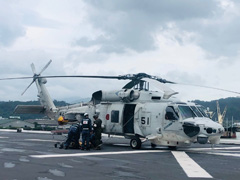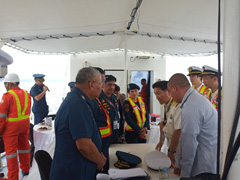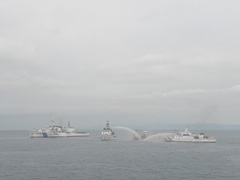- Home
- Countries & Regions
- Asia
- Philippines
- Press Release
- Japan holds disaster response trainings and marine pollution exercises in PH
Press Release
July 25, 2019
Japan holds disaster response trainings and marine pollution exercises in PH
 Disaster response training onboard the JS Izumo in Subic Bay
Disaster response training onboard the JS Izumo in Subic Bay
As part of Japan's efforts to share expertise on disaster response with the Philippines and also in time for the Philippines' National Disaster Consciousness Month this July, the Japan Maritime Defense Force, Western Army, and Japan Ground Self Defense Force (JGSDF) recently held a disaster response training at their lead ship JS Izumo in Subic Bay.
Officials of the Office of Civil Defense (OCD), Philippine Navy, Philippine Marine Corps, Department of Social Welfare and Development (DSWD), and Department of Health (DOH) attended the seminar composed of exercises, drills, and operation of equipment that Japan uses when disasters strike. Japan and the Philippines share common experience in cases of natural disasters, both being located at the Pacific Ring of Fire. A 2017 World Risk Index Report of the United Nations (UN) cited both Japan and the Philippines as among the island and coastal nations vulnerable to natural disasters.
Aside from Japan's defense forces, the Japan International Cooperation Agency (JICA) has also been supporting the Philippines' disaster response capabilities since the 1970s through both structural (river revetment, dikes, and dams) and non-structural measures (education and trainings). "Saving lives is of utmost importance to Japan's disaster response. We have been sharing our experience and knowhow with partners like the Philippines so they can learn from our experience and be able to address their own disaster response challenges," said JICA Philippines Chief Representative Yoshio Wada.
In the Philippines, economic losses from natural disasters have reached P96 billion from 2006 to 2015, according to a report from the Philippine Statistics Authority (PSA). The Philippines enacted Republic Act 10121 or the Act Strengthening the Philippine Disaster Risk Reduction and Management System that helped establish the country's frameworks and policies on disaster management.
During the training in Subic, the Japan Maritime Defense Force emphasized the importance of "sea basing capability" in cases of maritime and non-maritime disasters. The sea basing capability includes organizing a helicopter base at sea and a central command post ready to respond in case of disasters.
Japan's Western Army in charge of defense and security in Kyushu and Okinawa in Japan also shared their experience in disaster operations like using various search and rescue equipment in cases of earthquakes, tsunami, and other disasters.
Meanwhile, the JGSDF underscored the role of Japan's military in saving lives, removing debris, search and rescue, transportation, and livelihood activities during disasters. The JGSDF has assisted disaster-stricken nations all over the world including the Philippines in the 2013 Typhoon Yolanda, Ghana in the 2014 Ebola fever disaster, and Nepal in the 2015 earthquake. In 2018, the JGSDF held life-saving and road clearance activities after the Great Rain Disaster that affected Hiroshima and other prefectures.
 Officers and crew from Indonesia, Philippines, and Japan in Davao City
Officers and crew from Indonesia, Philippines, and Japan in Davao City
In the same week, Japan held the Indonesia-Philippines-Japan Regional Marine Pollution Exercises (MARPOLEX) in Davao City. The activity is part of ongoing efforts to enhance the capacity of Southeast Asian countries against marine pollution such as oil spills. One of the ten multi-role response vessels (MRRVs) that JICA provided to the Philippines, the MRRV 4408 Cape San Agustin was deployed for the exercises.
The Philippine Coast Guard (PCG), Japan Coast Guard (JCG), and Indonesia's Directorate General of Sea Transportation joined the search and rescue, fire fighting, and oil spill response exercises. Said activity is part of a 1992 regional agreement to respond to the Sulawesi Sea oil spill. Philippines and Indonesia hold these exercises alternately every two years.
 Firefighting demonstration at the joint marine pollution exercises
Firefighting demonstration at the joint marine pollution exercises
JICA, the world's largest bilateral aid agency, has been supporting the Philippines' disaster risk reduction and maritime safety efforts, including the first flood forecasting system in the country in 1974, and a comprehensive human resource development program with the PCG since the 90s. Ten MRRVs provided to PCG started its operation in 2018 and has been actively contributing to the increased maritime safety of the Philippines.

- Asia
- Southeast Asia
- Cambodia
- Indonesia
- Laos
- Malaysia
- Myanmar
- Philippines
- Thailand
- Timor-Leste
- Viet Nam
- East Asia
- China
- Mongolia
- Central Asia and the Caucasus
- Armenia
- Azerbaijan
- Georgia
- Kyrgyz Republic
- Tajikistan
- Uzbekistan
- South Asia
- Afghanistan
- Bangladesh
- Bhutan
- India
- Maldives
- Nepal
- Pakistan
- Sri Lanka
- Oceania
- Latin America
- Africa
- Middle East
- Europe
- Asia
- About JICA
- News & Features
- Countries & Regions
- Our Work
- Thematic Issues
- Types of Assistance
- Partnerships with Other Development Partners
- Climate Change / Environmental and Social Considerations
- Evaluations
- Compliance and Anti-corruption
- Science and Technology Cooperation on Global Issues
- Research
- JICA Development Studies Program / JICA Chair
- Support for the Acceptance of Foreign HRs / Multicultural and Inclusive Community
- Publications
- Investor Relations
